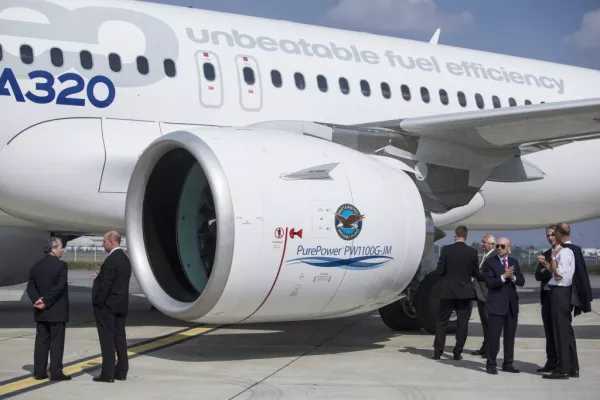Airbus SE announced the biggest commercial-plane deal in its history, securing an order valued at nearly $50 billion for 430 planes from its single-aisle A320neo line.
The pact with U.S. investor Indigo Partners gives Airbus the upper hand at the Dubai Air Show, where it has been trailing Boeing Co. in orders. It’s also a crowning achievement for Airbus sales chief John Leahy, who is set to retire after a multi-decade career in which he has struck deals for thousands of jets and lifted the European planemaker into a duopoly position with its rival.
For Indigo Partners, led by Bill Franke, the Airbus accord provides upgraded narrow-body aircraft to boost the fleets of low-cost carriers from Denver to Budapest. The planes will go to four companies in Indigo’s investment portfolio: Frontier Airlines, Mexico’s Volaris, European operator Wizz Air Holdings Plc and upstart JetSmart, which began operating this year in Chile.
The deal features 273 A320neo jets together with 157 of the larger A321neo variant and is worth $49.5 billion before customary discounts, Airbus said. Leahy, 67, called the transaction “remarkable,” while Franke, 80, who co-founded Indigo in 2002, said it underscores his confidence in the A320 and the bargain fares, no-frills travel model he helped develop.
Airbus shares rose as much as 3.9%and were trading 3.7% higher at 86.67 euros as of 9:06 a.m. (November 15) in Paris, taking the gain this year to 38%.
More to Come?
Even with the massive haul from Indigo, Airbus may not be done at the Dubai event. Other mooted orders may still materialize on Wednesday, people familiar with the matter have said, including an accord with EgyptAir Airlines Co. for A320neos and one with discount carrier FlyDubai. The latter is weighing an order for as many as 175 narrow-body planes that could be split between the A321neo and Boeing’s 737 Max.
The Indigo deal more than doubles Airbus’s previous order book for the year, which stood at about 290 aircraft as of October 31, pushes the planemaker’s backlog above 7,000 jets and reverses expectations that orders will trail deliveries in 2017.
The haul will also help Airbus catch up to Boeing in the order tally this year, with the European planemaker having chalked up 343 contracts at the end of last month, compared with 690 for its Chicago-based rival as of November 7. The order also trumps a 2015 deal for 250 single-aisle jets worth $27 billion by Indian budget carrier IndiGo. The two companies aren’t related.
The massive A320 win takes the sting out of a possible defeat on the A380 superjumbo, which has so far failed to clinch a follow-up deal with local carrier Emirates at the Dubai show. The companies have been in talks on a deal for about 36 additional double-deckers valued at $15.7 billion, people familiar with the negotiations have said.
The A380 has become all but a fringe product for Airbus, with a total order book of 317 -- more than 100 short of the A320s that Indigo plans to buy.
The breakdown of the Indigo order is as follows:
Wizz -- 146 planes (72 A320neo, 74 A321neo) Frontier -- 134 planes (100 A320neo, 34 A321neo) Volaris -- 80 planes (46 A320neo, 34 A321neo) JetSmart -- 70 planes (56 A320neo, 14 A321neo)
The purchase provides a boost to Airbus Chief Executive Officer Tom Enders, who has found himself on the defensive amid an investigation into bribery allegations at the company. Enders has warned employees that the probe is likely to be a drawn-out process that could result in “serious consequences” and “significant penalties.”
A German who has run Airbus for five years, Enders orchestrated another coup last month when he struck a deal with Bombardier Inc. to take a majority stake in the Canadian company’s C Series jet program. That will give Airbus access to advanced technology while throwing Bombardier a lifeline for its slow-selling aircraft.
Fly-by-Wire Pioneer
The A320 is Airbus’s best-selling product and the aircraft that put the company on the map when it was introduced in the late 1980s with cutting-edge technology such as fly-by-wire controls and a side-stick to steer the plane rather than Boeing’s central yoke.
Airbus was first to pioneer the new-engine variant of its existing single-body model. The A320neo first flew in 2014 and has been delivered to customers around the world. Boeing’s response, the 737 Max, only entered commercial service this year.
Narrow-body aircraft, which typically seat six abreast in economy class, are the workhorses of the global airline fleet. Burgeoning demand for air travel will push jetliner sales to more than 34,000 worldwide in the next 20 years, according to Airbus’s 2017 global market forecast. Almost three-quarters of that will be single-aisle models, the company said.
While a huge commercial hit, the A320neo hasn’t been without technical faults. Output is being disrupted by manufacturing delays at Pratt & Whitney, a unit of United Technologies Corp., which supplies the plane’s geared turbofan engine. The A320neo is also powered by engines made by CFM International, a venture between General Electric Co. and Safran SA.
Airbus makes the A320 family at different sites around the world, including its main factory in Toulouse, France, as well as in Hamburg, Germany. The company also builds the plane at an assembly line in China, and has recently pushed into the U.S. with a plant in Mobile, Alabama.
News by Bloomberg, edited by Hospitality Ireland









